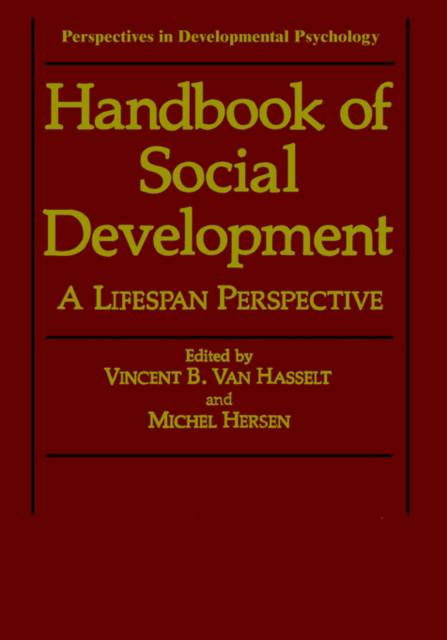
Bedankt voor het vertrouwen het afgelopen jaar! Om jou te bedanken bieden we GRATIS verzending (in België) aan op alles gedurende de hele maand januari.
- Afhalen na 1 uur in een winkel met voorraad
- In januari gratis thuislevering in België
- Ruim aanbod met 7 miljoen producten
Bedankt voor het vertrouwen het afgelopen jaar! Om jou te bedanken bieden we GRATIS verzending (in België) aan op alles gedurende de hele maand januari.
- Afhalen na 1 uur in een winkel met voorraad
- In januari gratis thuislevering in België
- Ruim aanbod met 7 miljoen producten
Zoeken
Handbook of Social Development
A Lifespan Perspective
€ 335,95
+ 671 punten
Omschrijving
Social development over one's lifetime is a complex area that has received consider- able attention in the psychological, social-psychological, and sociological literature over the years. Surprisingl however, since 1969, when Rand McNally published Goslin's Handbook of Socialization, no comprehensive statement of the field has appeared in book form. Given the impressive data in this area that have been adduced over the last two decades, we trust that our handbook will serve to fill that gap. In this volume we have followed a lifespan perspective, starting with the social interactions that transpire in the earliest development stages and progressing through childhood, adolescence, adulthood, and, finall one's senior years. In so doing we cover a variety of issues in depth. The book contains 21 chapters and is divided into five parts: I, Theoretical Perspectives; II, Infants and Toddlers; ill, Children and Adolescents; Iv, Adults; and V, The Elderly. Each of the parts begins with introductory material that reviews the overall issues to be considered. Many individuals have contributed to the final production of this handbook. Foremost are our eminent contributors, who graciously agreed to share with us their expertise. We also thank our administrative and technical staff for their assistance in carrying out the day-to-day tasks necessary to complete such a project. Finall we thank Eliot Werner, Executive Editor at Plenum, for his willingness to publish and for his tolerance for the delays inevitable in the development of a large handbook.
Specificaties
Betrokkenen
- Uitgeverij:
Inhoud
- Aantal bladzijden:
- 608
- Taal:
- Engels
- Reeks:
Eigenschappen
- Productcode (EAN):
- 9780306441417
- Verschijningsdatum:
- 31/08/1992
- Uitvoering:
- Hardcover
- Formaat:
- Genaaid
- Afmetingen:
- 182 mm x 261 mm
- Gewicht:
- 1270 g

Alleen bij Standaard Boekhandel
+ 671 punten op je klantenkaart van Standaard Boekhandel
Beoordelingen
We publiceren alleen reviews die voldoen aan de voorwaarden voor reviews. Bekijk onze voorwaarden voor reviews.








